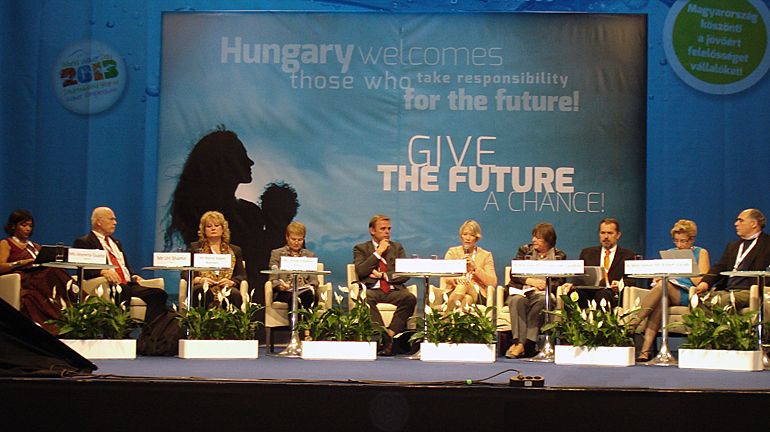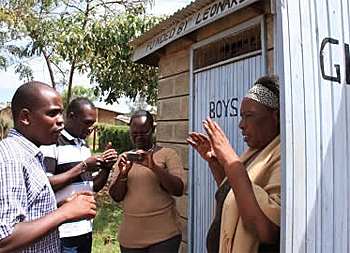Budapest Water Summit: ”Getting more transparency by using real-time data on water infrastructure”

“We have the ICT-technology to monitor the water supply real-time with cell phones. This way we can get more public transparency on how the water supply is actually functioning and what the water quality really is. It is happening in Uganda right now”, said Michel Rentenaar (middle on photo) , acting Director climate, energy, environment and water at the Dutch Ministry of Foreign Affairs.
Rentenaar participated in the high-level panel discussion on ‘smart’ sustainable development goals (SDG) during the Budapest Water Summit on 10 October.
Water linked to other goals
In 2015 the United Nations wants to put new global targets in force to succeed the current UN Millennium goals that will expire in two years. The current global discussion in the water sector concentrates on a stand-alone SDG-goal for water. At the Budapest Water Summit the UN briefed the water professionals on the progress for a goal on three pillars: (1) access to drinking water and sanitation, (2) sustainable use of water resources and (3) waste water management. By January the pillars will officially be presented, including the percentages that make the goals measurable.
The discussion in Budapest concentrated mainly on the interlink age of the water problems with other issues such as energy supply, food production, health care. The global water sector realizes it cannot work on water problems in isolation. Yet, by having a stand-alone goal the water problem will get recognition on presidential levels by all UN members states, meaning that there will be more funds made available.
 Local reports on the actual status of wash facilities are reported to AKVO Flow and made public on internet.
Local reports on the actual status of wash facilities are reported to AKVO Flow and made public on internet.
Down to earth transparency
The remark by Michel Rentenaar, on behalf of the Dutch government, was more down to earth about transparency. He referred to the fact that in many cases a new water infrastructure is realized but nobody is concerned about its use.
By monitoring the real-time situation is it possible to keep track of failures in the water supply, or in disruptions of the water quality. This is not only of interest to the local water users, but also to donor countries and their tax payers.
Rentenaar referred to the monitoring system developed by the Dutch foundation AKVO. Local people can use their cell phones to report water related information in a standardized way to a central data base. The data is visualized on a map and made public via internet on an open website. “ This is already happening in Uganda”, Rentenaar told his audience.
Also read on this website
• Budapest Water Summit: Final collective call for dedicated global water goal, 13 October 2013
• Budapest Water Summit: Out spoken Dutch experts address summit with experiences, 11 october 2013
• Budapest Water Summit: “In the end, it is all about human dignity”, 11 October 2013
• Budapest Water Summit: Water governance and WASH central themes in Dutch contributions, 6 October 2013
• World Water Day – The Hague: Global water community endeavors cooperation on food, energy and health issues, 23 March 2013
More information
Budapest Water Summit
www.budapestwatersummit.hu
Ministry of Foreign Affairs
The Hague, the Netherlands
+3 70 348 00 00
www.government.nl
AKVO Flow
Amsterdam, the Netherlands
+31 20 820 01 75
http://akvo.org/products/akvoflow/
see the real-time reporting AKVO-Flow page: http://watermapmonitordev.appspot.com/
Video on the use of AKVO FLow by Kenya WASH Alliance partners in Kajiado, Kenya.



